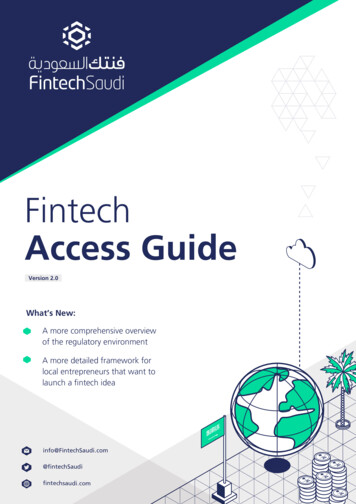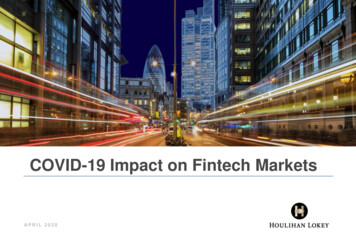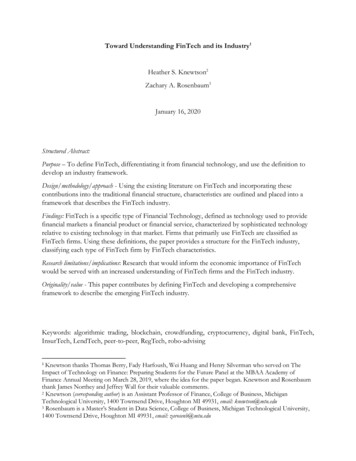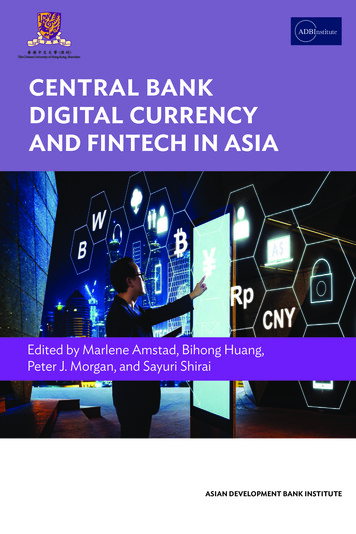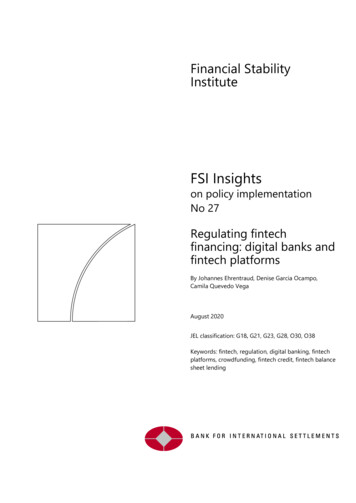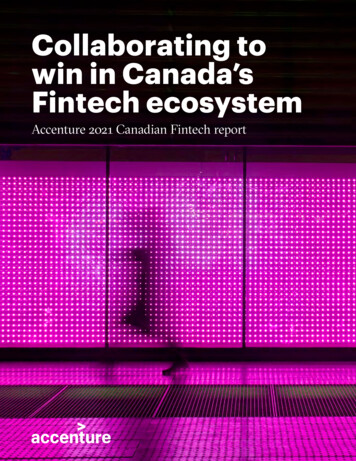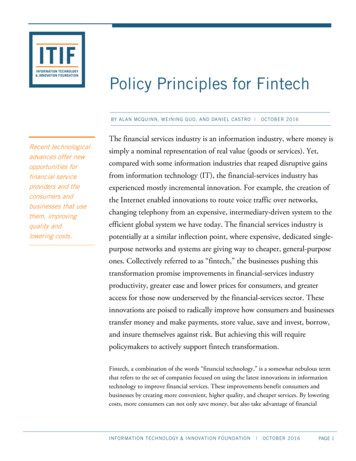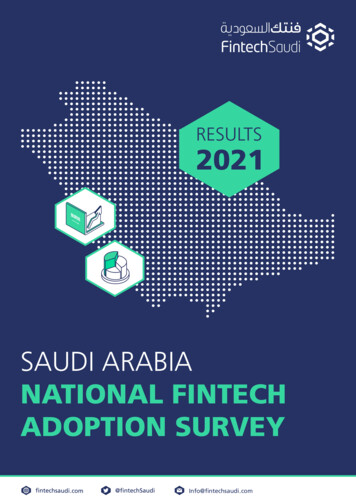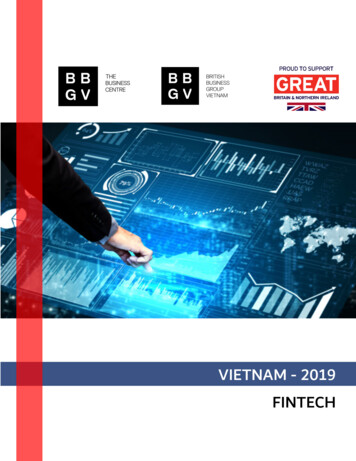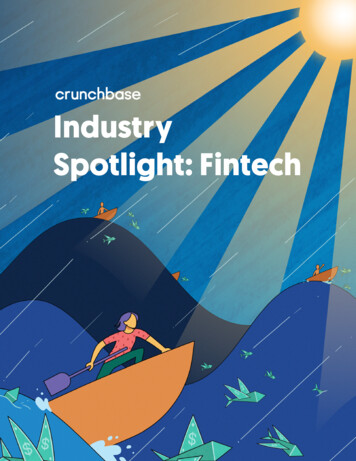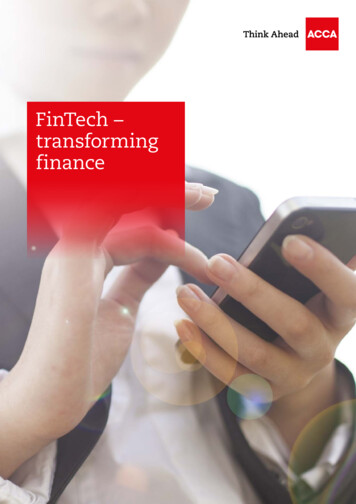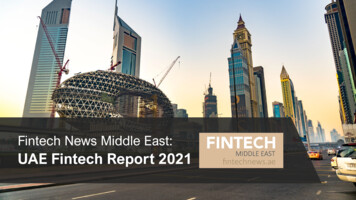
Transcription
Fintech News Middle East:UAE Fintech Report 2021
Contents UAE at a GlanceUAE’s Fintech LandscapePayments in the UAEFintech Initiatives and RegulatoryDigital BankingBlockchain/ CryptocurrencyCrowdfundingInsurtechOther Key Fintech Developments
UAE At a GlanceHigh penetration rates in UAE’s digital payments, banking and social media30US 354 billion9.99 millionPopulation (2021)Network Readiness Index2020¹ World Rank-7.7%6.10.95GDP Growth (2020)ATMs Per 10,000Adults (2020)99%172%69.4%10.2 millionGDP, current (2020)Internet Penetration(Jan 2020)Bank Branches Per10,000 Adults(2019)90%Mobile Connections(Jan 2021)Mobile BankingPenetration (2019)Number of Debit Cards inCirculation (2020)E-commerce UserPenetration² (2021)8.8 millionNumber of Credit Cards inCirculation (2020)Social Network99%Social Media Users(Jan 2021)90%Of Population(Jan 2021)54%Of Population(Jan 2021)Note: (1) Network Readiness Index (NRI) 2020 by Portulans Institute (2) Estimated E-commerce User Penetration in 2021, www.go-gulf.aeSources: Hootsuite, Digital 2021: The United Arab Emirates; Euromonitor International92%Of Population(Jan 2021)
UAE At a GlanceUAE ranked first among the Arab countries in FinxArThe Arab Monetary Fund launched the Index of Modern FinancialTechnologies in the Arab countries called the FinxAr. The index sheds lighton the developments in the financial technology industry and digitalfinancial services in the Arab countries during the period (2018-2020).The annual index aims to identify the efforts of Arab countries in enablingand promoting fintech adoption. The United Arab Emirates leads the Arabcountries in the General Index, achieving an average of 75%. The generalindex for fintech in the Arab region (FinxAr) consists of six main indicesthat represent the main pillars of the fintechImage source: Fintechnews Middle EastSources: Fintechnews Middle Eastecosystem, including policies and legislation, the demand side, access tofinance, financial markets infrastructure, talent development to supportinnovations, and finally collaboration and partnerships.The general index scored 43%, and the indices for talents, andcollaboration & partnerships came in the forefront with 50% and 49%respectively, then the demand side and policies & regulations indices by44% each, while the results highlighted the need to pay attention to thepillars of financial market infrastructure and finance, as they scored 39percent and 18 percent, respectively.
UAE Fintech LandscapeFintech Map UAE 2021Payment (37)Insurtech (16)eKYC (3)Equity Crowdfunding (4)Comparison (7)Wealthtech (9)eWallet (10)Lending (11)Remittance (6)Blockchain/ Cryptocurrency (18)Fintech Map UAE 2021Digital banking/ neobanks (8)Data/ AI (6)Regtech (4)Open Banking (5)Sources: Fintechnews Middle East
Payments in the UAEConsumers in the UAE shifts away from cash to contactless paymentsUS 18.5 billion97%88%Payment Transaction Value in the UAEDigital PaymentTransactions in UAE in2020 (World Digital Report 2021)Of consumers plan to use at least one newmethod of digital payment such aswearables, biometrics, digital currencies orQR codes within next year83%Consumers state they willcontinue to use contactlesspayment post-pandemicSources: Mastercard Study, April 2021; Euromonitor International200AED billionConsumers shop moreonline than they didbefore the pandemicUAE individuals plan to use cryptocurrencieswithin next year250Of in-persontransactions arecontactless73%5in10Credit Card150Debit Card100Electronic Direct/ACHTransactionsCash50020152017Sources: Euromonitor International2019202120232025
Payments in the UAEKey drivers that are changing the payment industry in the UAEHigher financial inclusion with mobilefinancial services initiativesThanks to the Government’s WageProtection System, an electronic transfersystem that requires all corporations topay wages through approved financialinstitutions, and widely used e-wallets, acashless society is not a target beyondreach with the help of upcominginitiatives. The UAE government issupporting the mobile financial servicesinitiatives that provide solutions in thefinancial inclusion of the unbanked toensure a balanced system of cash anddigitalization in the paymentsenvironment.Sources: Fineksus 2021Increased investments in digitalizationThe average number of cards owned byan UAE bank customer is two, indicatingthe competition in the bank industry isintense. Banks are innovating themselvesby investing in the technologicaldevelopments to improve their marketingactivities, offers and customer services.Within the payment space in the UAE,regulators, banks, Fintech, and otherfinancial stakeholders need to form acooperation among themselves.E-commerce triggering the growth indigital paymentsThe high demand in the digital salesplatforms directly caused a growth in thedigital payments. There is a rivalry inbetween the e-commerce platforms toprovide the best service to the customerslike offering large-scale selection ofgoods, delivery on the same day, inhouse repair and payment. As the servicegets better, the number of digitalpayments also rise. The infrastructure toprovide a quick and effective paymentprocedure gains high importance. Asecure and user-friendly online shoppingexperience drives increased non-cashpayment solutions.COVID-19 accelerates the shift todigital paymentsIn the UAE, digital payments have beenmore than doubled over the last twoyears to US 18.5billion in 2020, accordingto Fintech company Stripe. Two-thirds ofUAE residents expect the country tobecome fully cashless by 2030, a poll byStandard Chartered.Preference for digital payments over cashon delivery or bank transfers risessignificantly as consumers shop onlinemore frequently. The infrastructure andaccessibility is now there for merchantsand consumers, and the pandemic haschanged consumer behaviour in a lastingway.
Payments in the UAEPayment Fintech Startups to Watch in 2021Founded in 2019, Tabby is a relativelyyoung buy-now-pay-later fintech startupbased in Dubai. Tabby partners withretailers to offer their customers, bothonline and in-store, the ability to deferpaying for their purchases for up to 30days or to pay in four equal monthlyinstalments at zero cost to theconsumer.The startup raised US 23 million in aSeries A funding round from Abu Dhabistate investor Mubadala InvestmentCompany and Arbor Ventures inDecember 2020 after it announced apartnership with Visa and joined theSaudi Arabian Central Bank’s regulatorysandbox for fintech firms. It secured aUS 7 million funding round in June2020.Sources: Fintechnews Middle EastFounded by former Google employees,Mamo Pay is a Dubai-based peer-topeer (P2P) payment app. Mamo Payallows users to make payments andtransfers using the recipients phonenumber or email address only,simplifying the traditional process anddata that banks usually require, like IBANnumbers.Mamo Pay went live in December 2020after raising US 1.5 million in April fromGlobal Founders Capital (GFC) withparticipation from Global Ventures,VentureSouq, MSA Capital, Dubai AngelInvestors (DAI), 500 Startups and someangel investors. It joined Visa’s FintechFast Track program in June.Established in 2014, Telr is an awardwinning, Dubai-based startup providingpayment gateway solutions for small andmedium-sized enterprises (SMEs),government bodies and largecorporations.Telr offers a set of APIs and tools thatenable businesses and organizations toaccept and manage online payments viaweb, mobile and social media. It alsooffers digital invoicing, anti-fraudsecurity and real-time monitoringservices, QR Codes, social commercesolutions.Telr raised an undisclosed funding inDecember 2019 from existing investorsincluding iMENA Group. Telr currentlyhas offices in the UAE, Saudi Arabia,India and Singapore.NymCard is an end-to-end paymentplatform partnering with financialinstitutions to provide a digital paymentsolution to the unbanked and offer theirclients a superior payments experience.With its cloud-based, open API,Nymcard’s platform enables financialinstitutions, corporates, and fintechs todeploy and launch virtual, plastic andtokenized cards. The startup hascollaborated with financial institutions inIraq and Jordan to launch innovativeproducts, and is eyeing marketsincluding the UAE, Saudi Arabia andEgypt. NymCard received an in-principleapproval from ADGM’s Financial ServicesRegulatory Authority (FSRA) in August2020.
Fintech Initiatives and RegulatoryUAE emerged as a startup hub for regional financial sectorThe UAE government has decentralized its approach to Fintech by introducing more than 40 ‘free zones’ among the seven Emirates. Each free zone operatesunder separate regulatory and governance structures, largely independent of the “mainland” (or known as “onshore”) authorities. As such, the rules andregulations applicable to companies situated in free zones differ from the rules and regulations applicable to companies operating in the mainland.Regulators and Organizations Driving FinTech Developments in the UAEUAE OnshoreSources: The Rise of Fintech in the Middle East, Milken InstituteAbu DhabiDubaiOpened in 2015, the Abu Dhabi Global Market(ADGM) free zone is located on Al Maryah Islandand plays a key role in implementing Abu Dhabi’sEconomic Vision. Three independent authorities –the Registration Authority, the Financial ServicesRegulatory Authority, and ADGM Courts – governthe free zone and maintain a business-friendlyenvironment. The free zone acts as the preferredgateway to the Middle East, Africa, and CentralAsia.The Dubai International Financial Centre (DIFC)free zone is located right in the heart of Dubai andplays a key role in implementing several of theEmirate’s strategic initiatives. DIFC is governedby three independent bodies: the DIFC Authority,the Dubai Financial Services Authority, and theDispute Resolution Authority. By 2020, the DIFCrecorded more than 2,500 active registeredcompanies operating in the Centre, of which 821were financial services firms.
Fintech Initiatives and RegulatoryReview on the UAE’s National initiatives on FintechUAE Fintech OfficeNational Innovation StrategyIn Dec 2020, the Central Bank of UAE (CBUAE) launchedits fintech office to support Fintech activities in thebanking sector and facilitate the establishment of a UAEapproved regulatory framework in co-operation with otherFinTech authorities in the UAE (including in the DIFC andADGM). The new office aims to develop a mature fintechecosystem within the UAE and position the nation as afintech hub regionally and globally.In 2014, the UAE launched the National InnovationStrategy, which aims to make the UAE among the mostinnovative countries in the world by 2021. In recent years,the UAE has accomplished a series of significantachievements in the field of innovation covering allsectors, most notably the development of educationalsystems, boosting computer use and smart devices inschools and establishing several technological institutes.National Artificial Intelligence Strategy 2031Emirates Blockchain Strategy 2021In April 2019, the UAE Cabinet adopted the NationalArtificial Intelligence Strategy 2031, a 10-year strategyaims to develop frameworks for AI adoption across selectsectors and make UAE a global leader in AI by 2031. TheUAE is cultivating ties with foreign partners, establishingagreements with India, China and Israel. In 2019, Chinesefirm UBTech Robotics clinched a US 362M contract to setup AI labs for Emirati students.In April 2018, the UAE government launched the EmiratesBlockchain Strategy 2021. It aims to shift 50% ofgovernment transactions to the blockchain within 3 years.Smart Dubai made great strides towards digitizing the DubaiGovernment. It includes Dubai Pay, a centralized paymentgateway for government payment collection, and UAE PASS,a national digital identity platform. The Dubai PaperlessStrategy, which utilizes blockchain, digitizes completelygovernment transactions internally and externally.Sources: Fintechnews Middle East, Trade Press
Fintech RegulatoryKey Fintech Initiatives by DIFC and ADGMDIFC Fintech Hive is a platformthat drives innovation andshowcases success by identifyingleading technology entrepreneursand companies and offeropportunity to develop, test andmodify their innovations in collaboration with DIFCand regional financial institutions such as EmiratesNBD, Visa and HSBC. In 2020, it reveals scale upprogramme such as virtual accelerator, ASPIRE,designed for post series A start-up companies with ascalable and repeatable business model.ADGM Hub71 is a flagship initiativeof Ghadan21, Abu Dhabi’saccelerator programme forbusinesses in the capital. Inpartnership with Microsoft,Mubadala, Abu Dhabi InvestmentOffice, ADGM and SoftBank, Hub 71 offers aninterconnected network to enable innovation andgrowth opportunities for transformational tech andstartups. Since its launch in Mar 2019, Hub71 hasattracted more than 100 tech startups setting upbase at Abu Dhabi and raised US 50millionSources: Fintechnews Middle East, Trade PressDIFC Innovation Testing License(ITL) Programmethe DFSA regulatory sandbox, thathelps innovative fintech startups testtheir products in a controlledenvironment.As founding members of the Global FinancialInnovation Network (GFIN), DIFC participate insetting the strategic direction of the initiative. ITLprovides firms flexibility to test and develop conceptswithin the sandboxed environment subject to variousrestrictions and modifications.ADGM Introduced in Nov 2020,ADGM Digital Lab is a regulateddigital environment to allow financialinstitutions, technology vendors andFintech startups to collaboratearound new productsand business models, under the supervision of thefinancial regulator. It replaces the previous regulatorysandbox, RegLab, which was launched in 2016.Digital Lab offers access to resources such as data,APIs, system images and reference architectures.DIFC Launched in 2019, andmanaged by Wamda Capital andMiddle Venture Partners, DIFCFintech Fund reinforces DIFCcommitment toward FinTechcompanies through its acceleratorprogramme and fun, helping them to grow andupscale in the Middle East, Africa and South Africa(MEASA) markets. In 2020, DIFC has dipped in to itsUS 100 million to invest in four fintech companies –FlexxPay, Go Rise, NOW Money, and Sarwa.ADGM Abu Dhabi CatalystPartners (ADCP) is a joint venturebetween Mubadala InvestmentCompany based in Abu Dhabi andFalcon Edge Capital, based in NewYork City. ADCP was established inApr 2019 with committed capital ofUS 1billion. ADCP has a dual mandate to achievefinancial returns while also contributing to the overalldevelopment of the ADGM. In 2021, ADCP investedin fintech Securrency, social media platformTelegram, and Netflix Mideast rival Starzplay.
Fintech Initiatives and RegulatoryADGM and DIFC Fintech Regulations adopted2019CROWDFUNDING DFSA issued acomprehensive set of rules foroperators of debt and equity crowdfunding platforms, including regulatoryframework for loan and investmentbased crowdfunding platforms.DATA PRIVACY DIFC enhances dataprotection law (DIFC Law No.5 of2020). The new law aligns the DIFC’sdata protection regime withinternational best practice and revisesrules on the collection, handling,disclosure and use of personal data inthe DIFC.CRYPTOCURRENCY DIFC proposed acomprehensive regulatory frameworkfor regulating Security TokensPAYMENT The Dubai FinancialServices Authority (DFSA) introduced aseries of updates to its Rulebookmodules to revise its regime for“Providing Money Services” in theDIFC. Under the new regime,“Arranging and Advising on MoneyServices” is regulated as a new type offinancial service and a wider range ofpayment services activities arepermitted.NovSources: Abu Dhabi Global Market (ADGM), Dubai International Financial Centre (DIFC), Trade PressOct2020CAPITAL MARKETS ADGM updatesits Virtual Asset Regulatory framework.The amendments include rulesconcerning the authorisation andsupervision of virtual assets (previouslycrypto assets) related activities.AugFebApr2021AprCAPITAL MARKETS ADGM publishesguidance on Authorisation of DigitalInvestment Management ("Roboadvisory") ActivitiesPAYMENT ADGM Introducesenhancements to the regulatoryframework for Providing MoneyServicesJanSTARTUPS DIFC launches newInnovation License, a collaborationwith the Dubai Future Foundation(DFF), to drive blockchain and AI drivenstartups in financial sector.eKYC Dubai Economy and DIFC joinhands to unify corporate eKYCplatforms to form UAE KYC BlockchainConsortium.JulNovFebREGTECH ADGM launches threeRegulatory Technology (Regtech)initiativesPAYMENT ADGM introducesenhancements to the regulatoryframework for Providing MoneyServices.PAYMENT ADGM enacts ElectronicTransactions 2021API ADGM publishes guidance onthe development and use ofApplication Programming Interfaces(APIs)CAPITAL MARKETS ADGM issuesGuidance –Regulation of DigitalSecurity Offerings and Virtual Assetsunder the Financial Services andMarkets RegulationsDATA PRIVACY ADGM introduces aregulatory framework for Third PartyFinancial Technology ServicesDATA PRIVACY ADGM enacts itsnew Data Protection Regulations 2021,replacing the Data ProtectionRegulations 2015
UAE Digital BankingUAE leads the digital banking scene in the Middle EastDigital banking is heating up in the Middle East with the UAE representingthe major hub for banking innovation. Most of these neobanks arelaunched by incumbents as standalone digital banks and provide a fullrange of financial products that aim to act as full replacements fortraditional banking offerings.In the UAE, there are Liv and E20 by Emirates NBD, Mashreq Neo byMashreq Bank, and ADCB Hayyak by Abu Dhabi Commercial Bank.In the UAE, the current framework for fintech licenses requires companiesto partner with a bank, which has to own 51% of the venture. Suchcollaborations include NOW and Commercial Bank of Dubai (CBD), as wellas Rise and United Arab Bank.Over the past two to three years, the UAE Central Bank has outsourcedinnovation on regulatory frameworks to the Financial Services RegulatoryAuthority (FSRA) and Dubai Financial Services Authority (DFSA), but theseoffshore jurisdictions have no authority over banks licensed by the CentralBank.As such, FSRA and DFSA’s licensing were viewed as advisory guidelinesrather than regulations, creating jurisdictional uncertainty that poses aquestion to both fintech and investors.Sources: Fintechnews Middle East, Image: Middle Eastern neobanks, Fincog, Nov 30, 2020Overview of Neobanks Middle EastTurkeyIsraelIraqEgyptSaudi ArabiaBahrain 440 20 151Million populationIn the Middle EastMillion neobankcustomersNeobanks in theMiddle EastUnicorn bankUnited Arab Emirates
UAE Digital BankingDigital solutions by banks in the UAEBanks in the United Arab Emirates (UAE) in particular have taken the lead in adopting digital solutions. In the UAE, a number of banks have undertaken numerous digital banking initiatives,ranging from launching separate digital-only banking platforms, to strengthening existing mobile banking services.LaunchedDigital BankingMay 2017Powered ByDescriptionEmirates NBD (ENBD) launched a millennials digitalbanking proposition“The UAE banking sector has joined theOct 2017Mashreq Bank launched Mashreq Neo, its full-servicedigital bankFeb 2018Abu Dhabi Islamic Bank (ADIB) is partnering with FidorBank, Europe’s original digital challenger bank,founded in 2009, to launch a ‘ community-baseddigital bank’Feb 2018Sep 2019Sources: Fintechnews Middle EastCommercial Bank of Dubai launched CBD NOW, alsotargeting the millennial and digitally connectedcustomers with a mobile propositionEmirates NBD (ENBD) launched a digital mobile-onlybusiness bank designed for SMEs and entrepreneursglobal trend of technology transformation,digitization and innovation that is sweepingfinancial services sectors around the world.Customers in the UAE are fast adoptingdigital banking services.“In many cases customers are demandingmore digital solutions that brings major costsavings to banks and convenience tocustomers.”Abdul Aziz Al Ghurair, CEO of MashreqBank and chairman of the UAE BanksFederation
UAE Digital BankingNeobanks make inroads in the UAEIndependent Neobanks in UAELaunched Mar 2017Partnering bank Commercial Bank ofDubai (CBD)Launched 2018Partnering bank United Arab Bank(UAB)Now Money provides digital accountsto offer low-cost remittance andother financial services to migrantworkers in Gulf. The fintech partnerswith businesses to provide their lowincome employees access to differentfinancial services. The businesses geta digital payroll solution to transfersalaries to workforce. Now Money hasraised US 7M in a fund round in Mar2021. Currently available in the UAE,the fintech plans to expand to Saudiand further develop its services andcontinue growth in the UAE.Rise is a neobanking platform thatprovides migrant and domesticworkers in the GCC region withfinancial products and services, aswell as educational material.The platform, accessible mainlythrough a mobile app, currently offersproducts including a bank account, anaccompanying debit card, remittanceservices, insurance products, andunsecured consumer loans.Rise raised over US 1 million infunding in March 2020. Backed by thelikes of MEVP and DIFC, Rise is nowlooking to expand to Saudi Arabiaand Bahrain.Sources: Crunchbase, Trade pressLaunched Mar 2021Partnering bank NAFounded Dec 2020Partnering bank UnamedDubai-based YAP is the firstindependent digital banking platformin the UAE. YAP does not have abanking license itself but haspartnered with RAK Bank to provideinternational bank account numbers(IBAN) and bank identificationnumber (BIN) to customers. YAP doesnot have a physical branch but offersfeatures such as spending andbudgeting analytics, peer-to-peerpayments and remittances servicesand bill payments to customers. Itdoesn’t offer loans and mortgages.Over 25,000 applicants pre-registeredin the past two months to use theapp.Bankiom is the latest entrant ofneobanks in the UAE, currently in itsBeta launch. The digital-only bank,based in Dubai, targets millennialsand mobile natives, providingbanking facilities online and throughapp platforms, including wealthmanagement, remittances, and acurrent bank account with anaccompanying payment card.Bankiom has partnered with a bankfor card issuance. Bankiom positionsto users as “a new way to manageyour money” and promises not tocharge any hidden fees for itsservices. Bankiom claims to haveaccrued more than 400,000 signupsprior to the launch.
UAE Digital BankingMore neobanks are coming in 2021Oct 2020 – Abu Dhabi state-ownedholding company ADQ announcedplans to set up a digital bank with aninitial capital of US 544M afterobtaining the legacy license from FirstAbu Dhabi Bank (FAB). FAB plans totransfer its license ADQ while it intendsto own a 10% stake in the digital bankand will have access to another 10% ofthe shares at the time of its initial publicoffering in the future. ADQ, which wasestablished in 2018, owns strategicassets such as Abu Dhabi Ports, AbuDhabi Airport and bourse operator ADX.Sources: Trade pressApr 2021 – UAE’s digital-onlyindependent bank, Zand, is set to golive, as it is subject to regulatoryapprovals as at 12 Apr 2021. Al MaryahCommunity Bank received a full UAEbanking license from UAE Central Bank,the first digital-only independent bankto have received such license. Zand isset to provide banking and financialservices to both retail and corporatesupon its launch. Mohamed Alabar,founder of Emaar and e-commerceplatform Noon.com, will chair Zand.May 2020 – Jingle Pay is another newplayer looking to launch in the UAEsoon. It aims to bring elements of socialpayments to mobile wallets backed bycash accounts for instantaneouspayments and easy P2P moneytransfers.Jingle Pay will offer a multi-currencyaccount and card, remittance, Nanofinancing, instant and free moneytransfer services and other value-addedservices to its clients.The neobank will also remove therestrictions on bank accounts like theminimum balance requirements, for itstarget customers.
UAE Blockchain/ CryptocurrencyUAE sees rapidly expanding blockchain ecosystemRegulators and government agencies in the UAE are multiplying initiatives to embrace tokenization and blockchain. In Jan 2021, the UAE Centre for the Fourth Industrial Revolution(C4IR UAE) signed a partnership with Dubai International Financial Centre Authority (DIFC) and Dubai Financial Services Authority (DFSA), unveiling a pilot sandbox, which couldeventually lead to the full licensing in the digital assets and blockchain sector.Jul 2020DEX, a global digital assetsmarketplace,headquartered in AbuDhabi, secured a FinancialServices Permission (FSP)from FSRA in ADGM2019Oct 2016The DubaiBlockchainStrategy 2020launchedApr 2018The EmiratesBlockchainStrategy 2021launchedJul 2020MidChains, an upcomingregulated digital asset exchange,closes new funding round.Approved by ADGM, MidChainsis expected to launch cryptotrading operations in 2021Jan 2021Bahrain-based Rainraises US 6 millionSeries A to grow itscryptocurrencyexchange in MiddleEast2020Jul 2019Matrix receives In-PrincipleApproval (IPA) from by theFSRA to operate in ADGMJun 2018ADGM launchescrypto assetregulatoryframeworkNov 2020Globalblockchainpayments firm,Ripple, sets upa regional basein DubaiApr 2021UAE Trade Connect (UTC),blockchain-based digital platformco-created by Etisalat Digital,goes live with seven UAE banksApr 2021Securrency raisesUS 30 million toproduceblockchain-basedinfrastructure forfinancial institutionsMay 2021BitOasis, a digitalasset tradingexchange,securesregulatoryapprovals fromADGM2021Mar 2020FSRA updatesits virtual assetregulatoryframeworkFeb 2020DMCC¹ announcedstrategic partnershipwith CV Labs tolaunch Crypto Valleyin DubaiNov 2020UAE Securities and CommoditiesAuthority (SCA) issues the finalcrypto assets legislationSep 2020DIFC and Dubai FutureFoundation signs MoU toboost blockchain and AIdriven startups withaccelerator programmesFeb 2021UAE Central Bank joins AsianBanks for Blockchain enabledCBDC project “m-CBDC² Bridge”Jan 2021The UAE Centre for the Fourth IndustrialRevolution (C4IR UAE) forms a partnership withDIFC and DFSA to launch a pilot sandbox toprovide a controlled regulatory forum to testtokenizations of digital assets through blockchainMay 2021DMCC sets upCrypto Centerin DubaiApr 2021Dubai Economy and DIFC signsagreement to expand the UAEKYC Blockchain Consortium –combine KYC data from financialinstitutions and create a unifiednational e-KYC platformNotes: (1) DMCC refers to Dubai Multi Commodities Centre, a government-backed entity established for global commodities trade in Dubai’s tax-free zone. (2) m-CBDC Bridge refers to Multiple Central Bank Digital Currency Bridge isa wholesale CBDC co-creation project that explores the capabilities of distributed ledger technology (DLT) and studies the application of CBDC in enhancing financial infrastructure to support multi-currency cross-border payments.
UAE CrowdfundingCrowdfunding regulations in the UAECrowdfunding is the practice of funding a project by raising money from a large number of people through licensed online platforms. Common types of crowdfunding include donationsmodel, rewards model, crowd-source equity funding (CSEF), and debt/ P2P lending model. In the UAE, fundraising activities for charities and social causes are regulated and done throughstate-based registered channels. However, in spite of new developments, however, loan and investment crowdfunding is still not specifically regulated in mainland UAE. In Sep 2019,CBUAE proposed a draft regulation for loan-based crowdfunding platforms (CFPS).DFSA Crowdfunding FrameworkIn August 2017, the Dubai Financial Services Authority(DFSA) launched a legal framework for loan andinvestment-based crowdfunding platforms, the first suchregulatory framework in the GCC countries. TheRegulations are part of the DFSA Conduct of Business(COB) Module under section 11. The DFSA frameworkaims to license, organise and protect the rights andobligations of all parties involved in specific crowdfundingactivities which provide finance solutions for SMEs in theregion.In July 2019, DFSA has updated its crowdfundingregulatory framework, setting out additionalrequirements for property crowdfunding platforms.ADGM Private Financing FrameworkSCA Crypto Assets RegulationsIn Sep 2018, the Financial Services Regulatory Authority(FSRA) issued the ‘Regulatory Framework for PrivateFinancing Platforms’ serving equity investment, debtfinancing and trade receivables funding needs of startups, private enterprises and SMEs. The frameworkrequires the operators of PFPs, to have appropriatesystems and controls in the areas of due diligence ofthose enterprises listed on the PFP, risk disclosures,safeguarding of client assets, anti-money laundering andcounter-terrorist financing (AML/CFT), amongst others.In Nov 2020, UAE Securities and Commodities Authority(SCA) issues the final crypto assets legislation. It isdesigned to regulates key aspects of dealing in cryptoassets, from issuance and promotion, to licensing andconduct of business for custodians, exchanges, and‘fundraising’ platforms. Crypto fundraising platforms aresimilar to equity-based crowdfunding platforms, whichallows investors to subscribe to crypto assets such as inan initial token offering. A crypto fundraising platformmay not offer trading services to investors unless licensedby the SCA as a crypto asset exchange.Notes: Central Bank of the UAE (CBUAE), the Securities and Commodities Authority (SCA), Financial Services Regulatory Authority (FSRA) in Abu Dhabi Global Market (ADGM), Dubai Financial Services Authority (DFSA) in DubaiInternational Financial Center (DIFC)
UAE CrowdfundingLeading Crowdfunding platforms in the UAELaunched in 2014, Beehive is the first regulated peer-to-peerlending platform in MENA to be regulated by the
Sources: Mastercard Study, April 2021; Euromonitor International. 88%. Of in-person transactions are contactless. US 18.5 billion. Digital Payment Transactions in UAE in 2020 (World Digital Report 2021) 5in10 . UAE individuals plan to use cryptocurrencies within next year. 97%. Of consumers plan to use at least one new method of digital payment .
